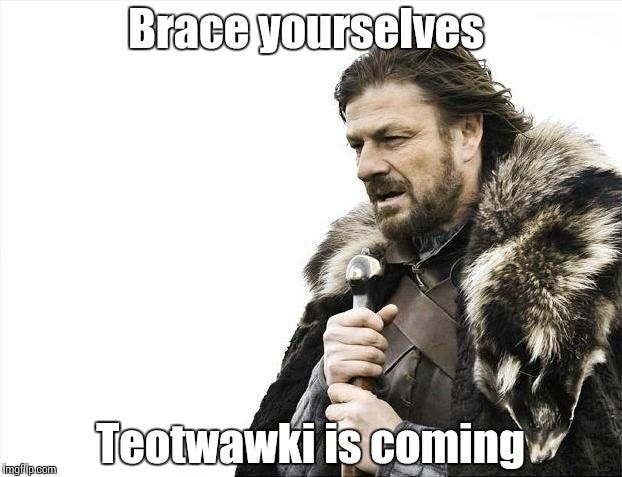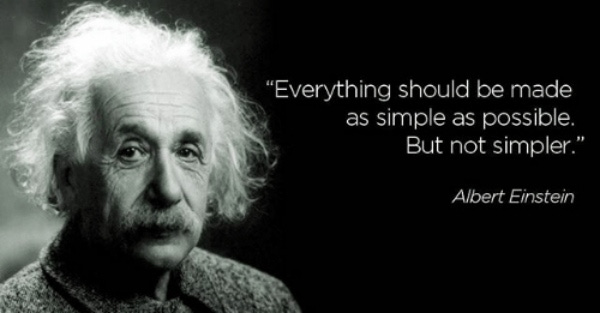From prepping to metaverse, and forward
it's a bad world out there. Better be prepared, right?
This post, the first of the series I originally announced here on Substack, is about one of those things that, as obvious as they may be for some, are never repeated and clarified enough.
First, some ad-hoc definitions
In this post, "metaverse" is the umbrella term for any kind of "digitally powered place" in which people ("metaversers") may "move" to "live" non-negligible parts of their lives, as avatars of their own making. This includes cyberspace, addictive social media, Virtual Reality, some AI Singularities, the "official" metaverse apparently "buried" by Zuckerberg himself just a few days ago and anything of the same kind that may pass the next rounds of VC funding.
Also in this post, "prepping" only means the apocalyptic, long-term, lifelong version of the much wider practice of "making active preparations for a possible catastrophic disaster or emergency, typically by stockpiling food, ammunition, and other supplies." Prepping for "TEOTWAWKI", that is: "End Of The World As We Know It)".
Those disasters may be natural or social ones, from hurricanes to civil wars. But it's worth noting that, both for Oxford Languages (via Google) and the Wiktionary, this meaning of prepping comes from North America, especially the US.
This kind of prepping is:
excellent food for thought... if practiced as such
consumerism, milking people's fears that consumerism around them may collapse at any moment
by definition and necessity, self-centered, limited to one individual and, at most, his closest acquaintances
often born out of disgust for the surrounding system, or fear (or hope) that it's so unstable that it may collapse any moment
an attitude and lifestyle that, should it become the norm, would increase the probability of certain disasters
apparently blind to certain limits, that as far as I can see goes too often unchallenged
The main limits of prepping
TEOTWAWKI long-term prepping is not long-term at all. Not even medium-term, probably.
For one thing, that prepping seems to completely ignore aging or long-term loneliness. It probably couldn't do much about it, but still... more often than not, it seems to just ignore those problems even exist. Don't ask, don't tell. Problem is, as I read in a backpacking forum just a few hours ago:
"Heck, if even Thoreau came back from the woods, everybody will (want to)".
And indeed, Thoreau came back exactly because even one like him "had several more lives to live".
Even ignoring aging, illness or loneliness, there are NO places, for anybody who may know or care about prepping, to stay really safe from the long-term realities of any TEOTWAWKI. This is true for every prepper, from billionaires building spaceships or bunkers in New Zealand, to plain homesteaders and every urban customer of "prepping subscription boxes" (yes, Apocalypse-Preparedness-As-A-Service is a thing):
The obvious reason, explained in more detail here, is that after a few years "no place will remain untouched because it not just about climate, weather events, social systems, or politics. It's everything, [and it's just ONE] network of systems — made up of individuals — all interconnected and fragile".
So far, nothing particularly new, and I'm sure many others have already said the same things, better than me. Let's go digital then.
Luckily, metaverses are not prepping
Metaversers are deeply different from preppers, in two important, shamefully underrated ways. The smallest, but still nightmarish one is that traces left behind in metaverses can be "more useful than a fingerprint to identify individuals".
Above all, metaversers are way more fragile, both politically and technically, than preppers. They always will be, no matter how much they dream of being, or founding, their own independent country online. Actually believing any version of this:
"Governments of the Industrial World: On behalf of the future, I ask you of the past to leave us alone. You are not welcome among us. You have no sovereignty where we gather."
"We are forming our own Social Contract. This governance will arise according to the conditions of our world, not yours. Our world is different."
"I declare the global social space we are building to be naturally independent of the tyrannies you seek to impose on us."
was ridiculous when J. P. Barlow proclaimed the "Independence of Cyberspace" in 1996, and still is. No, you cannot found countries online, not meaningfully, that is. And no, not even with NFTs!.
The reality is that there is only one world and, just like their less ambitious "digital nomad" cousins, all the metaversers are hugely dependent on the physical places and institutions around them, and always will. Any metaverse feasible with any technology we have or can realistically aim for today would depend on good will of governments, worldwide trade, mountains of critical minerals, very high-tech manufacturing and maintenance... immensely more than living off self-farmed potatoes in a mountain hut.
Everybody aspiring to live in a metaverse is handling himself over a barrel to whoever can yank off the power cable of their server, or the drainpipes serving their buttocks.
But metaverses still are like prepping
Never mind those tiny differences between prepping and metaverses! As both JFK and Pope John XXIII would have said, "what unites them is greater than what divides them". Much greater, actually.
Both prepping and metaverses come, at least in their long-term and profit-driven incarnations, from the most anxious country of all.
Just like prepping, metaverses are built around "mandated, obsessive self-focus" and, albeit in "addicting but not genuinely fulfilling ways", aims to "almost entirely cater to the vast majority of human needs".
This argument alone may be enough proof that, for all practical and meaningful purposes, metaverses are just like prepping. But there is one more, maybe the most important.
No innovation here. None at all.
Metaverse may be a word one century younger than prepper, but is not new or innovative at all. Metaversing is a very conservative attitude, instead, and one that favours autoritarianism: democracy is where our bodies are. Metaverses check all the items in the TEOTWAWKI list above, exactly because both prepping and metaverses are games "rigged to isolate us from one another, and to obstruct the creation of communities... that might foster real and radical change", also known as "actual innovation". As Michael Crichton wrote one year before Barlow, instead of innovating, metaversing will "freeze the entire [human] species. Everything will stop dead in its tracks".
There is nothing innovative in metaverses. Not at the levels that really matter, for sure. They are the same old reactionary escapism as TEOTWAWKI, trying to move to the opposite side of the same screens, and without anything resembling resilience.

Like prepping, metaverses are technosolutionism that is irrelevant or unreachable for at least half the world population, and unable to really work as advertised for all the others. Long-term preppers are outdoor-enthusiast hikikomoris, and metaversers are digital long-term preppers. Both try to escape reality, instead of fixing it, but will never succeed as much, or as long as they would like.
Let's move FORWARD, then
Digital technology is advancing so fast that it obscures the fact that much of the real innovation that would solve existing problems is either not digital at all, or requires very different uses and development of all technologies, especially digital ones.
Escapes from our common reality remain illusions, even when they are digital. The really modern, really courageous preparedness for the future is social innovation here and now, with appropriate use of appropriate tech.
That innovation, which does not renegade digital technologies, just their mindless acceptance, is exactly what I hope to explore, discuss and promote here, with your support. Please comment to share suggestions, questions, critiques, and of course share this post, and consider upgrading your subscription!






"Prepping or Metaverse? What's best?"...neither.
Prepping is not a new idea, or a good one. As someone who grew up during the Cold War, I still remember the government offering fallout shelter plans along with advice on how much ammo to have when your neighbours come for your food.
As for the metaverse, it is a voluntary "Matrix" with crappier graphics. It's not a new or good idea either, as many have pointed out with reminders about Linden Lab's "Second Life", which is now 20 years old.
Rather than twisting on the horns of a false dilemma, we (the human race) have to actually do the work required to create a new vision for the future that is not "TWAWKI".